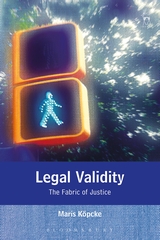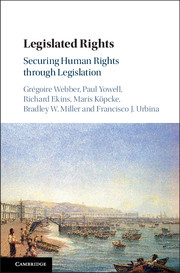| |
|
|
|
Publications
 Legal Validity: The Fabric of Justice (Oxford, Hart Publishing, 2019) Critical human interests are affected on a daily basis by appeal to past decisions deemed to be 'legally valid'. They include statutes, deportation orders, judgments, mortgage contracts, patents and wills. Through the technique of validity, lawyerly reasoning settles morally pressing matters in a way that largely bypasses moral argument. Legal philosophy has paid considerable attention to validity criteria, but it has neglected to explore validity’s point: whether, and if so how, the pervasive technique of validity can contribute to a legal system’s ability to realise justice and human rights. This book shows that validity can help a political community to foster justice precisely because validity does not primarily turn on moral considerations. Validity serves to both allocate, and limit, a distinct kind of power, a power that is key to forging valuable forms of enterprise and commitment in pursuit of individual and collective self-direction. By entrusting the capacity to decide to those who, in justice, ought to bear it, validity can enable persons and institutions to rally the resources and opportunities that only large-scale behavioural convergence can afford, thereby weaving a fabric of just relationships within the systemic framework of law.  Legislated Rights: Securing Human Rights through Legislation (Cambridge, Cambridge University Press, 2018) (co-authored with Grégoire Webber, Paul Yowell, Richard Ekins, Brad Miller and Francisco Urbina) The important aspects of human wellbeing outlined in human rights instruments and constitutional bills of rights can only be adequately secured as and when they are rendered the object of specific rights and corresponding duties. It is often assumed that the main responsibility for specifying the content of such genuine rights lies with courts. Legislated Rights: Securing Human Rights through Legislation argues against this assumption, by showing how legislatures can and should be at the centre of the practice of human rights. This jointly authored book explores how and why legislatures, being strategically placed within a system of positive law, can help realise human rights through modes of protection that courts cannot provide by way of judicial review. More in preparation! ‘Validez’ [Validity] in J. Fabra Zamora and V. Rodríguez Blanco (eds), Enciclopedia de Filosofía del Derecho y Teoría Jurídica, Vol. II (Mexico and Buenos Aires: UNAM and Rubinzal, 2015) ‘Desafíos del Rule of Law’ [Challenges of the Rule of Law] in Anuario de Derecho Constitucional Latinoamericano (Berlin and Bogota: Konrad Adenauer Stiftung, 2014) 591-610 Reprinted
with minor changes in J. Cianciardo; J.B. Etcheverry, C.D. Martinez
Cinca, J. Saldaña, P. Rivas, and P. Zambrano (eds), Filosofía
del Derecho y Derecho Natural: Estudios sobre Teoría Juridica
Contemporánea a partir de las Ideas de Carlos Ignacio Massini Correas (Mexico: UNAM, 2016) 475-97
‘Method and Substance in Marmor’s Philosophy of Law’ (2014) 10 Jerusalem Review of Legal Studies, no 1, 57–67 ‘Finnis on Legal and Moral Obligation’ in J. Keown and R. George (eds), Reason, Morality, and Law: The Jurisprudence of John Finnis (Oxford: OUP, 2013) 379-95 (oxfordscholarship link) ‘Concept and Purpose in Legal Theory: How to "Reclaim" Fuller’ (2013) 58 American Journal of Jurisprudence 75-96 ‘Positive Law's Moral Purpose(s): Towards a New Consensus?’ (2011) 56 American Journal of Jurisprudence 183-214 ‘Law, and the Difference Between What is Claimed and What is Done’ (2011) 8 Journal of Catholic Social Thought 255-75 ‘Law Does Things Differently’ (2010) 55 American Journal of Jurisprudence 201-24 ‘La nueva “Tierra Prometida”: derechos humanos del inmigrante frente a la sociedad de acogida’, in A. Marzal (ed), Migraciones económicas masivas y derechos del hombre (Barcelona: J.M. Bosch, 2002) 248-258 ‘Women’s Rights in Bolivia’, Report to the United Nations Committee Against Torture (C. Benninger-Budel, co-author), World Organization Against Torture, Geneva, July 2001
 Book in preparation A Short History of Legal Validity and Invalidity: Foundations of Private and Public Law (to appear with Intersentia, Cambridge) The twin ideas of legal validity and invalidity are ubiquitous in contemporary private and public law. But their roots lie buried deep in European legal culture. This book for the first time traces and reveals these roots. In the course of a 2000-year journey through landmark texts of the Western tradition, from Roman law to modern codification and constitutionalism, the book shows that, contrary to what is often assumed, validity and invalidity originated in the domain of private transactions and only gradually came to be deployed in the domain of official power and law-making. This went hand in hand with legal thought’s acknowledgement that law-making itself can be (in)valid, because legally limited, most recently by a body of constitutionally enshrined human rights. Understanding why, not only when, the technique of validity appeared, teaches valuable lessons about the kinds of social and political transformation that this technique can help realise – particularly in our age of emerging legal orders, shifting forms of governance, and fresh challenges to the regulation of exchanges in a digitally scripted world. Articles in preparation
|
||






